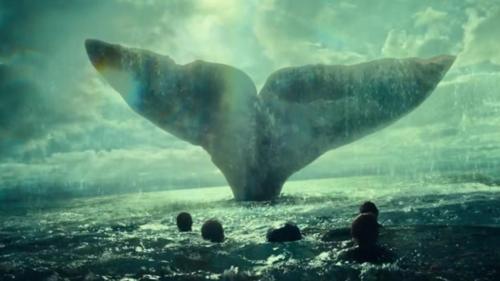Moby Dick, the
movie.
My
grandma Ada had a summer house in South Dartmouth , Mass. , and
I used to go to the New Bedford New Bedford was the capital of the New England whaling
industry – with Nantucket and Provincetown
The
world premiere of John Huston’s 1956 movie of Moby Dick was in New
Bedford New Bedford
It
wasn’t, in fact, a huge hit. I think it
made its money back, but that’s about it.
The reviews were lukewarm. Peck
took the biggest beating. He was too
young for the part, and he didn’t have the chops, but more than that, he was Greg Peck, he wasn’t supposed to play
some looney tunes with a peg leg. (That
would be Robert Newton.)
Huston
cast Orson Welles as Father Mapple, in a cameo.
Andrew Sarris remarked that Huston should have hired Welles to direct,
and played Ahab himself. There’s a
certain poetry in this. Huston’s clear first
choice for the part would have been Walter Huston, his father, but his dad was
now dead. Welles went on to do a very
interesting stage adaption, where he
played Ahab - I saw a later production of the play with Rod Steiger, and trust
me, no scenery went unchewed.
Going
back and watching the movie now, though, I have to say it’s unfairly
maligned. Ray Bradbury did the
screenplay, with Huston, and it’s very judicious – they emphasize the
spectacle, and lean only lightly on the Old Testament aspects. Peck is actually not embarrassing as Ahab;
he’s pretty good. John Wayne as Genghis
Khan it ain’t. Richard Basehart is wrong
for Ishmael, let’s admit, and Woody Strode was going to be the harpooner Queequeg,
but had a scheduling conflict. Leo Genn gets
a lot of mileage out of Starbuck, the sympathetic First Mate. In the long run, what Huston does with the
casting is to use faces. You probably didn’t know then who Harry
Andrews or Bernard Miles or Noel Purcell or Mervyn Johns were, but you knew a
great face when you saw one.
You
get a careful choice of detail. The
movie shows the doldrums, when the
wind dies and the sails flap idly, the ship in irons. You see routine, both the boring and the
terrifying: a spooky scene with St. Elmo’s Fire playing through the yardarms, a
Nantucket sleigh ride, the harpooned whale
dragging a longboat. There’s a strong
sense of how the ship functions, as a
mechanism, or a community. Bluntly, everything
In the Heart of the Sea got wrong,
this picture gets right.
One particular
thing of note, the cinematography, by Oswald Morris. You can look this guy up. He did eight pictures with Huston, Moby Dick was the third. He worked with Carol Reed and Tony Richardson
and Sidney Lumet. Very much a pro. But they used a special process, famously,
with Moby Dick. They shot the picture, and desaturated the
images. This is something that’s gotten
more common nowadays, because you can do it post-production. If you’ve seen John Boorman’s The General, for example, the picture loses
more and more color as Brendan Gleeson loses more and more of his moral center;
at the end it’s black-and-white. Band of Brothers uses a similar
technique: the combat footage has little or no color. Moby
Dick isn’t digitally manipulated. They
apparently printed a black-and-white negative over a color separation, and the
result is similar to looking at a hand-tinted illustration, of the period.
So,
something perhaps to revisit. A lot of
times we go back, and suffer disappointment.
It’s nice to go back, and be pleasantly surprised.










